| |
Splendid Journeys
July mix part two |
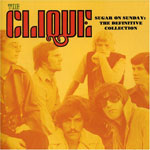 |
I don’t know about you,
but it always takes me a while to really get into the holiday swing.
It takes a week or so to really switch school off in my brain, which
is kind of a drag. Maybe this was why I insisted on sticking The Clique’s
cover of the Gibb brothers’ ‘Holiday’ onto my July mix; so it could act
as a means of preparing my head for the freedom that lay ahead. I guess
it kind of worked too, as my head became increasingly unable to process
pretty much any kind of work activity in the last few weeks of term.
Now one of the things I really love about the ‘60s Pop scene is the way
in which a variety of contemporaneous artists would each record the same
song, with the result being that several versions could be in the charts
at the same time. It is so fascinating to see the way that different
groups would give a new slant to a song, and I’ve always felt that it’s
something which would liven up Pop in the new Century. So The Clique
did their version of the Bee Gee’s ‘Holiday’ for their eponymous Gary
Zekley produced1969 set on White Whale, and a peach of a cover it is
too. It’s a classy album all round in fact, complete with classic singles
like ‘Sugar On Sunday’ and ‘Superman’ which was maybe made more famous
for some by R.E.M. in the ‘80s. It’s thanks to the fine people at Rev-Ola
(who else!) that this sees the light of day now, and whilst I could have
sworn that the team had already put a different version of this out in
the past, it seems that the other version I have was in fact on the Varese
Sarabande label, so so much for my memory. The Rev-Ola reissue is way
ahead though, with infinitely superior sleeve notes by the indefatigable
Steve Stanley and an extra four tracks that take the total up to 21 perfect
soft psych Pop classics. This is heartily recommended.
|
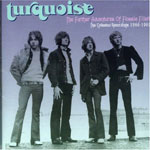 |
Rev-Ola in fact have
a string of really brilliant reissues around at the moment, continuing
to cement a worthy reputation as the finest band of sonic archaeologists
around. Older heads amongst you will be familiar with some of the material
I’m sure, but for younger adventurous souls I imagine that Rev-Ola is
rightly viewed as some kind of mother lobe gold mine. And if it isn’t
then sheesh, you people are missing out on some exceptional sounds. Like
the sound of Turquoise. Listening to their Further Adventures Of
Flossie Fillett (collected recordings 1966-1969) is a real delight,
and in fact I’m sure that somewhere in the depths of my past I’ve had
a couple of these songs on long lost compilation cassettes. In all probability
they cropped up on some of the magical collections of great lost and
obscure ’60s Pop that some of my hipster friends kept me supplied with
through the mail in
the late ’80s. The morning mail delivery in those days was like a cosmic intervention,
keeping my existence in the midst of nowhere somehow connected to a special and
sparkling network of underground sound and passion. Listening to the sound of
Turquoise now reminds me of those feelings, and seeing the photos of the band
remind me too of how I longed to be able to look that unfashionably cool, for
in the ’80s backwater where I lived it was criminal to want to look like a character
from Bronco Bullfrog. It would be tantamount to wearing a sign that said ‘drag
me behind the electrical sub station and kill me’. And the casuals would have
been more than happy to oblige. But Turquoise did look great, no question about
it, like little switchblade carrying dandies in cuban heeled loafers. They sounded
fabulous too, for all the world like the finer Power Pop moments of The Kinks,
and you know that is some mighty, mighty recommendation. Indeed, they even had
the wit to write a song called ‘Village Green’, and you know what? It’s not a
million miles from being as fine as the Kinks’ one. Of course they were Muswell
Hill neighbours to the Davies brothers, so maybe that's no surprise. Then
there
is ’53
Summer
Street’ which I chose to grace my mix; as ravishing and flamboyant a Pop record
you will never hear, and goodness knows why this never crashed into the top reaches
of the charts. They had connections after all that linked out to the likes of
the Rolling Stones, Spencer Davis Group, Kinks and The Who. Indeed, John Entwhistle
and Keith Moon did some production work on a couple of the tracks included here.
Naturally if you can you ought to be snapping up pretty much anything Rev-Ola
puts out, but if necessity means you must make choices, then the Turquoise collection
should
be at the top of your list. |
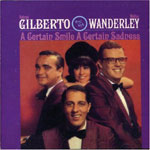 |
Similarly, the Temptation
Eyes set should be right up there. It’s a collection of songs
by hit songwriting duo of Michael Price and Dan Walsh, and
it’s a confection of choice cuts to be sure. Probably best known for the song
that gives the album its title (it was a big hit for The Grass Roots), the duo
penned tunes for the likes of Cher, Lulu and the Temptations, taking in a host
of influences from soft psych, folk rock and bubblegum Pop to concoct some truly
beguiling moments. Much of the album is previously unreleased songwriter demos,
and maybe it’s my love of sketchbooks that comes through here, but I really love
hearing these loose, spacious early drafts. The songs shine through and they
are fabulous of course. There is also a selection of tracks that Price and Walsh
laid down in 1968 with Gark Zekley for an aborted psychedelic concept album,
all of which are fascinating and should be heard. And anyway, you should always
want to investigate anything that Zekley had a hand in. More in-depth sleeve
notes by Steve Stanley and commentary by both Price and Walsh make this a treasure
that, like the Turquoise set, really should be nestling neatly in your collection
of sweet ’60s
sounds.
The next batch of reissue action comes courtesy of Rev-Ola and their Cherry Red
connected El partners. First up is Martin Denny from the Exotica Volume 3 set.
Now I have always struggled a little with Denny. He was one of those names so
widely venerated by the Lounge scenesters in the early ’90s, but like a lot of
the sounds touted by those hipsters I always struggled to see beyond the veneer
of chintzy schmaltz. I still do, regardless of the fact that I know his recordings
are musically adventurous and make intriguing connections. But then, not being
musical, maybe this is why I don’t really see the appeal. Still, at least I’ve
grown to enjoy that chintzy schmaltz at face value, and now admit that tracks
like ‘Harbor Lights’ are
highly enjoyable summer evening listening fare.
Much more enjoyable for me though is the Astrud Gilberto and Walter Wanderley
album A
Certain Smile A Certain Sadness. This 1966 release is pure magic, blending
Gilberto’s
unmistakeable voice with Wanderley’s space age Bossa sound to perfection. The
eleven tracks of the originally released album are all present and perfectly
correct, but it’s one of the two bonus tracks that I’ve picked out for my mix. ‘The
Sadness Of After’ is quite simply sublime, from the studio banter intro to the
false start and the spacious, sparkling piano backed delivery. It reminds me
of the kind of soft sadness I found so appealing in Tracey Thorn’s classic A
Distant Shore, and that’s a heartfelt comparison that works both ways. As
an
introduction to the magic of Astrud Gilberto, you wont find better than this. |
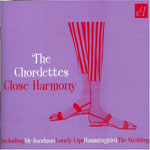 |
Over at El meanwhile,
they continue to unearth some fascinating early Pop texts, none more
engaging than the Chordettes Close
Harmony collection. The best known of the all girl acappella babershop groups
from the ’50s, The Chordettes are maybe best remembered for their 1954 smash ‘Mr
Sandman’ which I could not resist sneaking onto my mix. The first of thirteen
hit singles for the group over a period that lasted up to their 1961 demise, ‘Sandman’ topped
the US chart for seven weeks and has for sure become one of those songs that
evokes the idealised Americana of the ’50s that we know today. Certainly I always
connect the song with the fabulous first
instalment of the Back
To The Future trilogy, and whilst the inequality and prejudices of that
time are certainly not something we should aspire to admiring, there is a sense
of naiveté and simple pleasure that surely one cannot help but be attracted to.
Certainly contemporary groups like the fabulous Diskettes recognise this, and
I only wish that more groups would see it too. Like Marty says after dragging ‘Johnny
B Goode’ into the depths of Rock Hell at the end of the High School dance, although
they might not have been ready for that in 1955, their kids would, sadly, love
it. Of course with a hindsight that wasn’t really around in 1985, we know that
the hipper kids of the time were rightly loving the Chordettes and the Four Freshmen
(whose Blue
World is also out soon on El), and that those influences would lead us famously
to the Beach Boys, Mamas And Papas and The Association, but also less famously
to the likes of The Tokens and a host of other acts who recorded for White Whale
and others. And yes, I do dream of going back to those times (but not in a De
Lorean) and of witnessing those treasures first hand, but then, don’t we all?
Finally on the reissue front there’s the Mah-Na-Mah-Na set by the Dave
Pell Singers. This 1969 set by the famed West Coast jazz musician has been a
highly sought after artefact of vocal mod psychedelia for some time, and it’s
good to see it out on CD format at last. And it is as suitably strange as you
would expect, with covers of songs such as ‘Sugar Sugar’, ‘Honky Tonk Women’, ‘Ruby,
Don’t Take Your Love To Town’ and, quite bizarrely the title tune of Ken Tynan’s
controversial musical Oh,
Calcutta! Remarkably, it all works magnificently, and makes for a classy
set of breezy, sensual soft psych that’s just the thing for summer. |
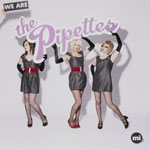 |
Now in getting back
to 2006 it seems logical that the next track should be from the Pipettes
debut set for Memphis Industries. I’ve written a lot about the Pipettes
in the past of course, and I have to admit to more than a little pride
in knowing that I helped give the world their first release, but that
already seems a lifetime away as polka dot fever hits the high streets
and The Pipettes storm the Real charts. This is how Pop should be, after
all: classy hooks and sassy looks, synchronised dance moves and handclaps,
a backing band that looks like they should be playing at Arnolds. Heaven.
Not that The Pipettes are some retro schmaltz. Oh no. The Pipettes are
a thoroughly Modern confection, and songs like the super ‘Sex’ that
I’ve slipped onto this mix prove the point magnificently. For The Pipettes might
acknowledge the appeal of bubblegum Pop, but they also know how to slip in a
neat lyric that is far from being all coy and stereotypical. For for all the
references to ‘60s girl group sound, as equally a relevant nod might be to both
Boy Meets Girl, or to Sperm Meets Egg, so what. And that’s McCarthy and Heavenly
respectively, in case you need a little helping hand. We Are The Pipettes is
for sure one of the most effortlessly complete and perfectly formed Pop albums
of this, or any year, and if it’s impact is slightly lessened for my having lived
with the majority of these songs in various sketch form for over a year already,
then so be it. And if too I am jealous of those whose new summer romances will
be fuelled by the sparkling euphoria of such a breathtakingly spectacular soundtrack,
then so be that as well. Me, I’ll just continue to let it accompany my mind meanders
and sub-conscious leaps of delight as I pedal through country lanes and sit amongst
grape vines and honeysuckle, content and delighted.
|
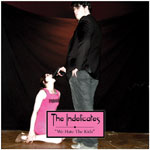 |
Of course for many the Pipettes will always have
been the line up of Rose, Riot Becky and Gwenno, but for some there remain
thoughts of Julia and a wonder for
what she did next… Well, the answer arrives in the shape of a spectacular 7” on
the Sad Gnome label. With a cover that will surely irritate as many as it will
delight in its obvious use of shock value imagery, the single itself is equally
antagonistic and perfectly confrontational. For The Indelicates’ ‘We Hate The
Kids’ is the kind of ready-made classic that groups must dream of writing. It
perfectly captures the hypocritical nature of the music industry, damning the
very roots of the system whilst simultaneously being desperate to belong. I love
it to bits, not least because it has the guts and the wit to shamelessly reference
Pulp’s ‘Common People’, itself surely one of the finest slabs of piercing irony
that cloaked acidic spite behind an addictive sing-along anthem. ‘We Hate The
Kids’ is every bit as good, though sadly unlikely to grace the charts or enter
the collective psyche. But that’s the collective psyche’s loss. Lyrically it
is as sublime as you could want and if I resist quoting at length here that’s
mainly because it would be hard to know where to start, or stop. If you trawl
the Net you’ll probably come across a sparser mix (that I actually prefer to
the ‘finished’ version) and a fabulous Hard Trance remix that is as cheesy as
it is brilliant, and reminds me of the awesomely vitriolic ‘Summer Of Hate’ by
Baxendale. Who remembers that? And in fact the Baxendale reference crops up again
with the Indelicates ace ‘Julia We Don’t Live In The ’60s’, whilst the widely
downloaded ‘Waiting For Pete Doherty To Die’ is
as classy and cutting an expose of the music industry as the single and is another
utterly essential addition to your collection. Snap up a couple of copies pronto,
for future eBay action surely awaits.
Having made a tangential reference to Heavenly earlier, it seems fitting then
to end this July mix with a track from Tender Trap’s 6
Billion People album for Fortuna Pop. It’s easy to take a group like Tender Trap for granted, as I’m sad to say that I did with this record for a while. I guess we have gotten so used to having Amelia Fletcher’s distinctive voice and sublime Pop aesthetic around us over the years, and it’s
at least as scary as it is comforting to realise that it has been nigh on twenty
years since Talulah Gosh first pierced our hearts. I know we have all been on
our journeys over those years. I know we have all explored new sounds and styles.
Yet somehow the pure and simple appeal of Pop remains, and Tender Trap recognise
that as much as The Pipettes, The Diskettes or The Chordettes. And 6
Billion People is a great record that does the great Pop thing with a natural slight of hand, a deceptively simple toss of a fringe and a coy knowing smile. With long-term friend Claudia Gonson (of Magnetic Fields and Future Bible Heroes) roped in on drums and backing vocals it should also cross the tracks to the Merritt adoring hipsters, though they probably already know of Fletcher thanks to her involvement with the 6ths of course. So if, like me, you passed over 6
Billion People when it was released back in the Spring, do yourself a favour
and pick it up. And if the name of Amelia Fletcher is one that you don’t already know and love, then take the treat of the trip down history’s
path and dig up all you can. The Heavenly output is pretty much all available
on the iTunes store, as are the previous Tender Trap and Marine Research releases,
whilst The Talulah Gosh Backwash collection should also be easy to come
by. It’ll be a splendid journey! ©
2006 Alistair Fitchett
|





